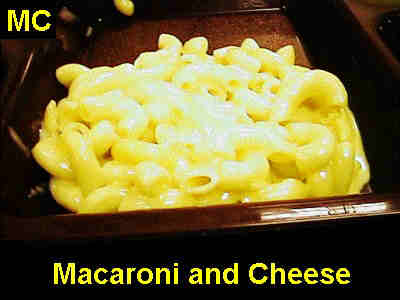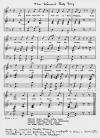
(Matthew 16:13-23)
May these words of this Peter be like a rock,
not a stumbling block!
|
|
"Who do you say
that I am?" Jesus asked. Simon Peter answered, "You
are the Messiah, the Son of the living God." And Jesus
answered, "Blessed are you, Simon son of Jonah! ... You are
Peter (petros), and on this rock (petra)
I will build my church..." Jesus then began to speak of
the rough road ahead. And Peter took him aside and rebuked him... "Get
behind me, Satan!" Jesus replied. "You are a stumbling
block..." (Matthew 16:13-23) May these words of this Peter be like a rock, |
"Chile con Carne"
Message preached January 5,
2003
Long Green Valley Church of the Brethren
Glen Arm, Maryland USA
based upon John
1:1-18
It
happened at a cook-out many years ago. A few days before, our group of campers
had carefully planned for this meal and submitted our list of ingredients. At
the proper time, we picked up our box of food from the camp kitchen and took it
back to the campfire, which the boys and girls had invested a great deal of
effort to make. All was going well until we discovered o ur
failure to ask for one particular item. Since the kitchen staff was no longer
available, our meal would just have to do without it. What was that item?
Cheese. Without cheese, macaroni is just a bunch of pasta.
ur
failure to ask for one particular item. Since the kitchen staff was no longer
available, our meal would just have to do without it. What was that item?
Cheese. Without cheese, macaroni is just a bunch of pasta.
Now, I know that at this point in time, food should probably be far down on our list of things to concentrate on. After all, many (if not most) of us probably ate way too much over the holidays. Right? Perhaps we could stand a few meals of plain old pasta, as we resolve to exercise more and lose a few pounds in this new year. Even so, I need to talk about food this morning. After all, this worship service concludes with a meal. Not a big dinner, mind you. Just a piece of bread and a little, itty-bitty cup of grape juice. Not bad for those on a diet. Of course, after Sunday School weíll up and share a covered dish meal to honor our teachers and other preachers. Well, maybe we should start work on our New Yearís resolutions ... this evening.
As your
good news cook this morning, I set before you one of the most delicious dishes
in the Bible. The recipe is found at the very beginning of the gospel of John.
This eighteen verse feast is how the evangelist John first introduces us to
Jesus. The aroma of these words floats throughout the rest of the story he
tells. Now, you may have noticed that the flavor of Johnís gospel is a bit
different from what Matthew, Mark, and Luke cook up. He uses many spices that
they do not, sort of like the curry powder found in many Indian dishes, or the
taste of lemon which is so much a part of Greek food. Johnís gospel is unique.
I find it very satisfying, though it takes some getting used to.
Now, I must confess that I am not the best of cooks. At home, our kids know that if Dad is responsible for supper, thereís a very good chance the meal will be composed of what? (family?) Spaghetti. Iím good at boiling the pasta, browning the meat, and pouring in the store-bought sauce. Left to my choice of vegetables, Iíll go for frozen peas, nuked in the microwave. Iím not a gourmet chef, like Chris Breidenbaugh. Nor am I a short-order cook, like Mike Hanna. Or even a "Mr. Barbecue," like Gary Miller. I couldíve substituted other names just now, but I might be walking on thin ice to suggest who was "gourmet," "short-order," or "BBQ," let alone to imply that some like me might just open a box, pop it in the oven, and place it on the table. Of course, there are also those among us who struggle even to do even that much in the kitchen.
This
morningís gospel meal did not originate with John, or so many folks think who
study this sort of thing in depth. Actually, it is thought that these verses
started out as a song - a hymn sung in worship. John simply quotes it. Beginning
this good news account of the life, death, and resurrection of Jesus with a
familiar song would be like entering into worship with a  hymn
of praise that everybody knows and can sing almost by heart. Isnít that sort
of what we do every Sunday morning when we gather together? Of course, over the
years the melody has been lost. We just have the words. Perhaps itís up to us
to discover the tune for today.
hymn
of praise that everybody knows and can sing almost by heart. Isnít that sort
of what we do every Sunday morning when we gather together? Of course, over the
years the melody has been lost. We just have the words. Perhaps itís up to us
to discover the tune for today.
I know,
here I go again, mixing metaphors. One minute Iím talking about food. The next
Iím off singing a song. Actually, listening to music and appreciating a meal
are not all that different from one another. I suppose we can hear a song and
pick out all itís component parts. But real enjoyment comes from the whole -
that is, when itís a good song, one we like. To focus upon just the words, the
beat, the melody, or the harmony is to miss all of them together. Likewise, when
I eat a meal, my enjoy ment
does not come from picking out which particular spice was used to flavor it. The
ingredients are important, but figuring out the recipe (even if I could) would
be the last thing on my mind when I eat. Itís the whole dish that matters.
ment
does not come from picking out which particular spice was used to flavor it. The
ingredients are important, but figuring out the recipe (even if I could) would
be the last thing on my mind when I eat. Itís the whole dish that matters.
I believe this is how we should approach this marvelous beginning to the gospel of John. Itís a song to which we listen, and perhaps even sing along, allowing the words to resound within us, to travel with us as we later leave this place and enter our work-a-day life. This beginning hymn is like a meal which we eat, and then continue to savor long after we push back from the table and go our way satisfied.
"In the beginning was the Word." Not just "a" word, or a "bunch" of words, but "the Word." Words are cheap in this and age. They fire up the Internet to the point where young people no longer are attracted to words. There needs to be something more to attract their attention. In fact, in conversation with one another online, they abbreviate words left and right, such that a parent looking over their shoulder hasnít a clue what is being said. Words are cheap.
The good
news of God in Jesus Christ isnít just a bunch of words. It isnít about ink
on a page, pixels on a computer screen, components of a sentence grammatically
placed into a paragraph in just the right way. Rather, it is a recognizable
voice that spe aks,
and the sound forms and transforms. It is a light that pierces every dark place,
and the shine from it brings to life all who turn toward it.
aks,
and the sound forms and transforms. It is a light that pierces every dark place,
and the shine from it brings to life all who turn toward it.
Imagine a child in her motherís womb who hears the sound of a voice that later is the most central thing in her life. Once born, she turns to this voice, which now has a face, and receives the basic sustenance that she needs to live. To be "born from above," a phrase found only in Johnís gospel, is to be so oriented - transformed, if you will - that Godís voice is the most central thing in your life. This Word is what sustains you.
Or, imagine a dance. We often place music and creative movement together. Of course, Brethren struggle a bit with dancing, at least some older generations have, seeing less "creativity" and more "hormones" active in the movement of young people. Even so, imagine a dance which begins with each person alone and frozen in place. As the light shines upon each one, they are free to move. Like King David, dancing before the ark of the Covenant when it was returned to Jerusalem long ago (2 Samuel 6:5, 16), they dance before the Lord not caring what others think. Their only concern is the song that God is singing, a Word that bring them to life.
"In
the beginning," not just on the first day of Creation, as in the book
of Genesis, but long before... "In the beginning was the Word."
This Word existed. "The Word was with God." It did not exist
alone. Relationship lies at the center of this Word. "And the Word was
God." Not just "a" God. Not just "divine." There is
not a separation between God and his Word. The two are One. This Word is
God, as surely as the great "I am who I am" is. By the way,
this is probably the highest affirmation of Jesus Christ in the Bible. For, as
we listen to the song, as we savor this meal, we r ealise
that this Word is a person. That Word from the very mouth of God is Christ
Jesus. There is a face behind the voice of God, and like newborn infants we
recognize in this face the sound of the voice that we have been hearing all
along, even at those points in life when we thought we were most alone and lost.
This Word awakens us.
ealise
that this Word is a person. That Word from the very mouth of God is Christ
Jesus. There is a face behind the voice of God, and like newborn infants we
recognize in this face the sound of the voice that we have been hearing all
along, even at those points in life when we thought we were most alone and lost.
This Word awakens us.
(sing:)
"In the morning when I rise,
in the morning when I rise,
in the morning when I rise, give me Jesus.
Give me Jesus,
give me Jesus,
you can have all this world, give me Jesus."
"And the Word became flesh," this Word took on human form. Touchable, seeable, knowable. As a child needs the sound of her motherís voice, she also needs her actual presence, the breast of her mother from which to receive the milk of life. A Fatherís voice can be recorded onto a tape, but if you were a child, would you rather have a picture book and a tape recorder, or a Fatherís lap and the tickle of his beard on your neck as his arms enfold you in a reading embrace? Are you too old for these images? John sings out that all who receive this Word in human form, all who reach out to accept Jesus, are empowered to become Godís children.
"And the Word became flesh, and made his dwelling among us." Literally, this Word pulled out a tent and pitched it in our own backyard. No, in our living room, in our bedroom, in our kitchen, in our dining room, in our office, in our schoolroom, on the factory floor beside us, on the sports field, on the Internet, wherever we dwell - there this Word is. This isnít just past tense, that Jesus took on human form long ago and lived in a land far away, in a time and culture that is so very different from our own.
No, if
"we have seen his glory," thatís not just from a history
book. God in Christ (through his Spirit, if you will) is camped out right where
we are now. He is present among us, his "glorious presence" (in Greek
his "doxa") transforms our daily life. We, even in the worst of
situations, can see his "doxa," his glory, his presence. His
"glory" was on the cross long ago. That was not what we would consider
a highpoint, and yet it was. God transformed that moment long ago, when his Son  -
this Word in human form - was crucified. In the same way, the Lord can transform
every moment, from grime to glory.
-
this Word in human form - was crucified. In the same way, the Lord can transform
every moment, from grime to glory.
You know, I love how we set up the front of our sanctuary at this time of year. I especially appreciate how the cross on our front wall seems firmly planted in the silhouette of Bethlehemís skyline, as we observe it from our pews. Itís as if the glory of the crucifixion - how God transformed the worst of human existence: sin and death - was part of the glory of what happened in Bethlehem. What especially touches me about this decoration is that Bethlehem could be any town on this globe. The cross of Christ is planted in every place. Godís glory can be seen everywhere. The "Word made flesh" pitches his tent in your home and mine.
I donít know what God is doing in bringing our newfound South American friends into this fellowship. Thus far, we have been blessed with the presence of three women from Brazil and one from Chile. Which reminds me of another dish to mention in this morningís meal. Chili is a spicy sauce made from hot peppers. I believe it is of hispanic origin, though I could be mistaken. It is often made with meat, as in "chili con carne," or "chili with meat" (or "flesh" if you will).
The wonder
of this song which begins Johnís gospel is what we call the
"incarnation." It speaks of how the Word became flesh - how Christ
took on "human," or "bodily" form, which in Latin is
"carne." It is a song about the in-carne-ation, incarnation. Yes, the
Word took on human form in Bethlehem, and walked the streets of Palestine long
ago. But this Word made flesh is alive and active in every land today, from
Conception, Chile ("Chile con carne," if you will) to Sao Paulo,
Brazil; from San Juan de la Maguana in the Dominican Republic to Dacca in
Bangladesh. Dare we say that Christ is alive and at work even in Baghdad, Iraq?
The glory of this song, of this meaty meal, for you is that we can behold his presence even here and now. The Word has set up camp among us as well. Not just in this holy place, which is no more holy than every other place. Christ Jesus lives wherever you live. His cross is planted in your town, in your home, in your work, in your school. He is there. Behold his "doxa," his glory, his presence. When we behold his "doxa," his glorious presence, we can't help but sing our doxa-logy, our doxology, our word of praise. (sing the Doxology)
Well, the Lord invites us now to eat with him, to remember what happened long ago in such a way that we know that he died to set us free from sin and death, and we know that he lives today. His cross, his glory is planted in our lives.
| online resources for this scripture text |
For commentaries consulted, see John. |
©2003 Peter L. Haynes